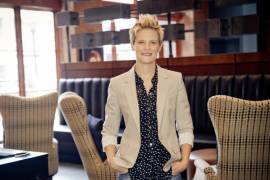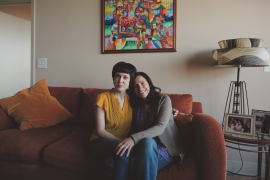
Federal Court To South Carolina: Fulton Doesn’t Do What You Think It Does
Blog Search
Yesterday, a federal trial court denied an effort by the state of South Carolina to effectively dismiss a lawsuit filed by Lambda Legal, the ACLU, the ACLU of South Carolina, and South Carolina Equality on behalf of Eden Rogers and Brandy Welch, who were turned away by a - foster care agency when seeking to provide a home to children in South Carolina’s care because they are lesbians and not evangelical Protestant Christians.
The ruling was issued in response to a request by South Carolina that the district court interpret the U.S. Supreme Court’s decision in Fulton v. Philadelphia to allow South Carolina to discriminate against LGBTQ people seeking to be foster parents. This is the first time a federal court considered the Fulton decision and affirmed that the ruling did not grant a blanket license to discriminate against LGBTQ prospective foster parents in the context of a child welfare case.
“Eden and Brandy were harmed by government-sanctioned discrimination and have the right to be treated equally. No matter how creative the state of South Carolina gets with its misinterpretation of the Supreme Court’s decision in Fulton, that fact isn’t going away,” said Lambda Legal Senior Counsel, Karen Loewy. “The Fulton decision addressed a very narrow set of claims and circumstances, none of which are present in this case. We are eager to move forward; for Eden and Brandy, but also for all of the children and young people in the child welfare system in need of stable and loving homes.”
Miracle Hill Ministries, South Carolina’s largest non-profit foster care agency licensed to provide child welfare services for children in state care, denied Eden and Brandy’s application to serve as foster parents after South Carolina requested, and HHS granted, a waiver of federal nondiscrimination rules for federally funded agencies. In so doing, HHS and the State authorized and enabled taxpayer-funded foster care agencies to use religious criteria to exclude families based on their faith and sexual orientation. The Trump-era policy that allowed for waivers from federal nondiscrimination rules for child welfare agencies receiving taxpayer dollars was recently rescinded by HHS, now under the Biden administration.
Providing for the needs of children in the child welfare system is a government function and the needs of children in care in foster care are provided for through federal and state funds. HHS and South Carolina have funded Miracle Hill with taxpayer money to perform child welfare services for children in state care even though Miracle Hill made clear that it excludes families based on Miracle “Hill’s religious beliefs. In order to foster through Miracle Hill, a family must agree with Miracle Hill’s “doctrinal statement,” including “that God’s design for marriage is the legal joining of one man and one woman in a life-long covenant relationship” – a requirement that excludes same-sex couples of any faith. HHS and South Carolina have sanctioned and facilitated the use of these religious criteria in the public child welfare system.
Lambda Legal, ACLU, ACLU South Carolina, and South Carolina Equality Coalition filed the lawsuit in May 2019 in U.S. District Court for the District of South Carolina on behalf of Eden and Brandy. The lawsuit claims that HHS, the HHS Administration for Children and Families, certain HHS officials, South Carolina Governor Henry McMaster, and the Director of the South Carolina Department of Social Services are violating the Establishment Clause and the Equal Protection guarantees of the U.S Constitution by authorizing and enabling the use of religious criteria by Miracle Hill to screen out would-be foster families because of their faith or sexual orientation.
Read about the case here: https://www.lambdalegal.org/in-court/cases/rogers-v-us-department-health-human-services
The attorneys working on the case are Currey Cook and Karen Loewy from Lambda Legal; Leslie Cooper and Daniel Mach from the ACLU; Peter T. Barbur and Katherine Janson from Cravath, Swaine & Moore LLP, and Nekki Shutt from Burnette Shutt & McDaniel on behalf of South Carolina Equality Coalition.



